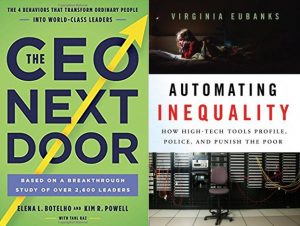 During the first quarter of 2018 I read a few dozen books published in the last fifty years. For the sake of this post, I’ve limited my recommendations to recently published works (books published since November 2017).
During the first quarter of 2018 I read a few dozen books published in the last fifty years. For the sake of this post, I’ve limited my recommendations to recently published works (books published since November 2017).
- (5+) Automating Inequality: How High-Tech Tools Profile, Police and Punish the Poor by Virginia Eubanks (St. Martin’s Press, 2018)
- (5.0) The CEO Next Door: The 4 Behaviors that Transform Ordinary People into World-Class Leaders by Elena L. Botelho and Kim R. Powell (Currency, 2018)
- (4.5) Kitchen Table Giving: Reimagining How Congregations Connect With Their Donors by William G. Enright (CreateSpace , 2017)
- (4.5) Interrupting Silence: God’s Command to Speak Out by Walter Brueggemann (Westminster John Knox Press, 2018)
- (4.5) Enlightenment Now: The Case for Reason, Science, Humanism and Progress by Steven Pinker (Viking, 2018)
- (4.0) Unbelievable: Why Neither Ancient Creeds Nor the Reformation Can Produce a Living Faith Today by John Shelby Spong (HarperOne, 2018)
- (4.0) The Tyranny of Metrics by Jerry Z. Muller (Princeton University Press, 2018)
- (4.0) Barna Trends 2018: What’s New and What’s Next at the Intersection of Faith and Culture by Barna Group (Baker Books, 2017)
- (4.0) The Mind of the Leader: How to Lead Yourself, Your People, and Your Organization for Extraordinary Results by Rasmus Hougaard and Jacqueline Carter (Harvard Business Review Press, 2018)
- (3.5) New Worshiping Communities: A Theological Exploration by Vera White and Charles Wiley (Westminster John Knox Press, 2018)
So What?
My MBA experience taught me the importance of data driven decision making. In recent years the availability of data has grown dramatically, and the use of data in a variety of fields has expanded significantly. The Tyranny of Metrics rightly notes that more data and more measurement isn’t always as helpful as it first appears thanks in part to those who misuse metrics or measure the wrong things as well as those who know how to game the system. Automating Inequality provides troubling examples of how data has been used in ways that make life harder than it otherwise would be for those who are poor. The CEO Next Door relies on a considerable dataset to show that CEOs are far more varied than most assume, and to illuminate four key behaviors that anyone aspiring to grow their personal leadership capacity can develop even if they are not seeking to enter the C-Suite: being decisive, delivering as promised, adapting boldly, and engaging with stakeholders without shying away from conflict. Barna Trends 2018 offers a wealth of charts, graphs and short narratives summarizing recent research conducted by the Barna Group presented in three categories: culture, life and faith.
Data is a powerful tool that can be used for good or for ill. The processes related to capturing, mining, and utilizing data can be costly and time consuming, but can also be relatively inexpensive and expedient. Whether considering measurement in the context of a faith community, non-profit, or for-profit business wise leaders welcome the opportunity to learn from new data.
- Reflect on how the increased availability of data has changed the way you make decisions and the way decisions are made in the faith community and/or non-profit you know best
- Share an example of an article or book you have read that effectively leveraged data to advance an argument in ways that would have been impossible or quite difficult a few decades ago.